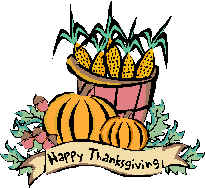| This is part 6 of a number
of facts associated with THANKSGIVING. This is an all American holiday. Although the US
and Canada celebrate the day on different dates, the purpose is the same. |
Part 6The Archetypal First
Thanksgiving:
The Pilgrim Thanksgiving in Plymouth may not have been the
actual first Thanksgiving, but it was the one that got all the press. The media developed
this gathering into what has become the traditional Thanksgiving.
On December 11th, 1620, the Pilgrims landed at a site that they were to name Plymouth
rock. They stopped here too pick up fresh provisions and do some laundry. The natives the
met here were rather hostile so there stay was short. They quickly put out to sea again in
search of a place to establish a colony. A little farther south, they found a much better
place to anchor than Plymouth. They also found the native population more friendly. Weary
and tired from weeks of crossing in crowded conditions they rested here and began a
colony. The original colony was not at Plymouth, and it was not the intended destination
farther down the coast in the area of the Carolinas. |
The tired travelers waded ashore in a fall of snow. They hastily erected shelter to
protect themselves from the bitter cold. They were ill-equipped, ill-provisioned,
ill-prepared for life in the wilderness. Of the 102 original passengers who set foot on
this continent, only 56 survived to the harvest the following year of 1621. The few
remaining colonists would not have survived the winter without the help of the native
population in the area. In recognition of that assistance, and in thanks for the bountiful
harvest and the mercy in having survived, Governor Bradford sent four men fowling and
declared a feast of celebration which included at the table 91 Indians and lasted three
days. Most of the feast was provided by the indigenous population. It is certainly known
that they provided venison. The menu likely included fish, berries, watercress, lobster,
dried fruit, clams, venison, and plums.
This feast may have been the basis for the Thanksgiving we celebrate today, but it was not
an annual event. The Pilgrims of Plymouth and the Boston Puritans were strict Calvinist
Protestants who rejected the religious calendar of holidays that the English people
inherited from the Middle Ages. They recognized only Days of Fasting, the Sunday Sabbath,
Days of Fasting and Humiliation and Days of Thanksgiving and Praise as legitimate
holidays. Thanksgivings marked favorable ("mercies"), and Fast Days unfavorable
("judgments") circumstances in community life. They were declared in response
to God's Providence. They were never assigned fixed positions in the calendar.
Thanksgivings or Fast Days could be declared at any time by individual churches, towns or
the colonial governments. There could be more than one in a single year or none at all.
The first real Calvinist Thanksgiving in New England was celebrated in Plymouth Colony,
but it was during the summer of 1623 when the colonists declared a Thanksgiving holiday
after their crops were saved by a providential shower. The colonists also
received
news that a ship carrying
supplies and more colonists that was feared sunk, was safe
and on its way. These prompted the Governor
of the colony to proclaim an official day
of thanksgiving.
Below is printed what is known as the "THE FIRST THANKSGIVING PROCLAMATION" In
the last several years this document has been said to be of 20th Century origin. Records
show that the celebration probably occurred in July, but the proclamation gives November
29 as the day of Thanksgiving. I don't know if the document is real or not. Given the
attempt of modern scholars to debunk traditional history, it is hard to say.
"In 1623, William Bradford, the first Governor of the Colony, wrote a proclamation
containing the spirit of the first Thanksgiving.
Inasmuch as the great Father has given us this
year an abundant harvest of Indian corn, wheat, peas, squashes and garden vegetables, and
made the forest to abound with game and the sea with fish and clams, and inasmuch as he
has protected us from the ravages of the savages, has spared us from the pestilence and
granted us freedom to worship God according to the dictates of our own conscience, now I,
your magistrate do proclaim that all ye Pilgrims, with your wives and ye little ones, do
gather at ye meeting house, on ye hill, between the hours of nine and twelve in the
daytime on Thursday, November ye 29th, of the year of our Lord one thousand six hundred
and twenty-three, and the third year since ye Pilgrims landed on ye Plymouth Rock, there
to listen to ye Pastor and render Thanksgiving to ye Almighty God for all his blessings.
|



